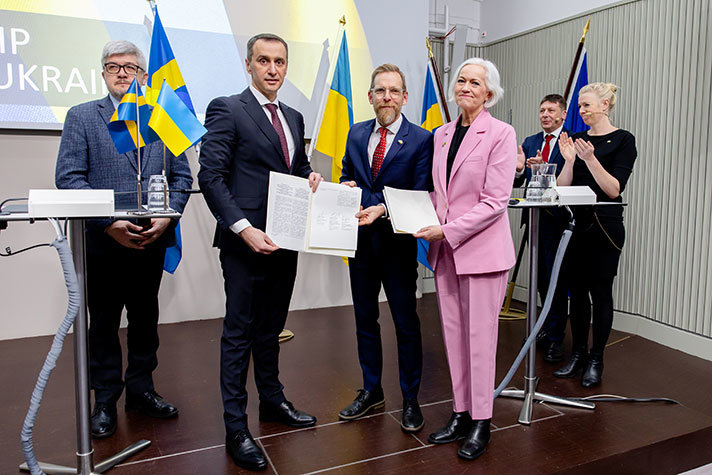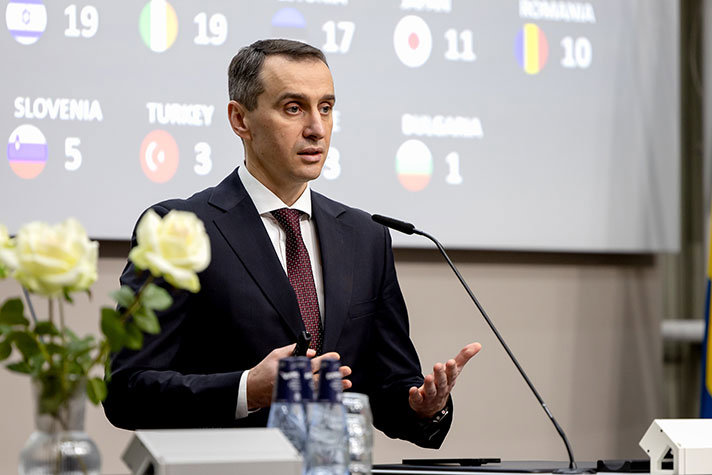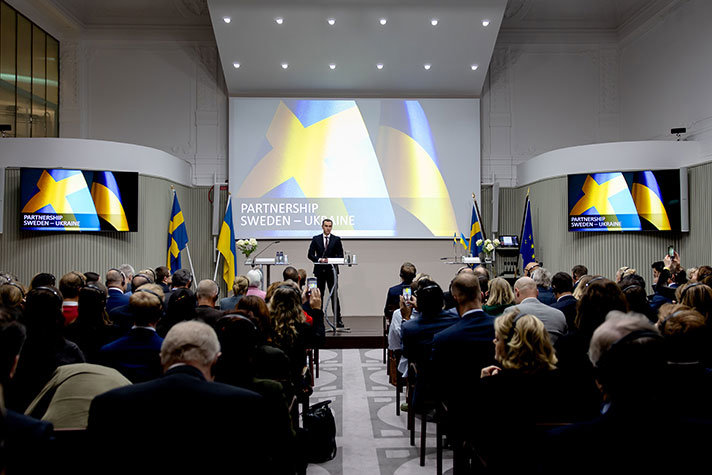Key health and medical care actors gathered at conference on support to Ukraine
Published
The will to support Ukraine is strong among Swedish health and medical care actors from both the public and private sectors. The Ministry of Health and Social Affairs and Swecare held a Conference on Support to the Recovery and Development of Health Care in Ukraine on 1 December to harness this engagement and discuss how Swedish support can be put to best use.
Minister for Health and Social Affairs Jakob Forssmed and Minister for Health Care Acko Ankarberg Johansson co-hosted the conference, where over 100 representatives of government agencies, the business sector, civil society, hospitals and academia, and European and international actors such as the European Commission, the World Health Organisation and the World Bank gathered. Minister of Healthcare of Ukraine Viktor Liashko also attended.
Long-term memorandum of understanding between Sweden and Ukraine
During the conference, the three ministers signed a memorandum of understanding between Sweden and Ukraine. The memorandum will create conditions for long-term cooperation, experience exchange and knowledge transfer between the Ministry of Health and Social Affairs and the Ministry of Health of Ukraine in areas such as pharmaceutical products, antimicrobial resistance, mental health, rehabilitation, cancer care, and skills supply in health and medical care.
“It’s a great honour and pleasure to have Viktor Liashko here in Stockholm to take part in the conference and sign the memorandum of understanding. This shows Ukraine’s great interest in developing our cooperation and benefitting from Sweden’s expertise in the area of health and medical care,” says Ms Johansson.
Immense needs in Ukraine due to Russia’s full-scale invasion
Since Russia launched an unprovoked and illegal full-scale invasion of Ukraine in February 2022, the need for trauma care, rehabilitation and mental health initiatives has been immense. Efforts are also needed to combat the emergence and spread of infectious diseases and antimicrobial resistance.
“The full-scale invasion has aggravated the problem of antimicrobial resistance and brings new challenges. It’s good that this was highlighted during the conference, considering the importance of the issue for Sweden, Ukraine and globally. Cross-border cooperation is needed to address this major health threat,” says Mr Forssmed.
The agenda included the Swedish Government’s Strategy for reconstruction and reform cooperation with Ukraine and examples of ongoing efforts in the health and medical care sector. Participants also discussed ways forward for Swedish actors to be able to support Ukraine’s efforts for better health care, with a focus on reforms that create a resilient and modern health care system. This work was already under way before the war.
Sweden’s support to Ukraine is long-term
Since Russia launched its full-scale invasion of Ukraine, Sweden has increased its humanitarian and military support to Ukraine on several occasions, and is also providing economic support, civilian crisis management, and support to Ukraine’s reform efforts and reconstruction. Sweden’s support to Ukraine stands firm and must meet critical needs in both the short and long term.
Sweden’s military, economic and humanitarian assistance totals over SEK 28 million since the war began. During the second half of 2023, Sweden has donated health care products, which are provided through the EU Civil Protection Mechanism, RescEU. Through participation in the Medivac EU mechanism, Sweden has also offered hospital beds to Ukrainian patients.
Cooperation agreements between Swedish health and medical care actors and Ukraine
During the conference day, three additional cooperation agreements were concluded between Swedish actors in the health and medical care sector and the Ministry of Health of Ukraine. The Swedish company Elekta, whose work focuses on radiation therapy for cancer, concluded an agreement on oncological treatment. Karolinska University Hospital also concluded two cooperation agreements during the day – one with Kryvyi Rih City Clinical Hospital in Kryvyi and one with OHMATDYT National Specialized Children’s Hospital in Kyiv. Trauma care, ear, nose and throat care, and health care for children are identified as main areas for enhanced cooperation.




 X
X